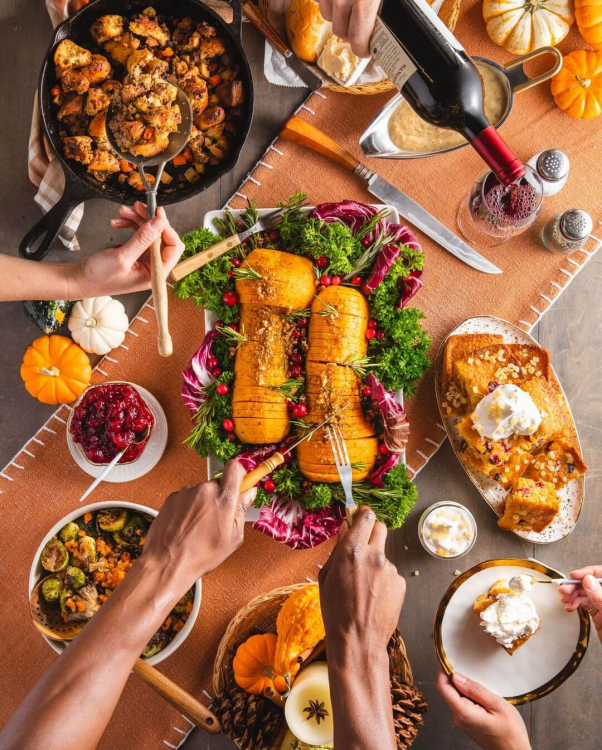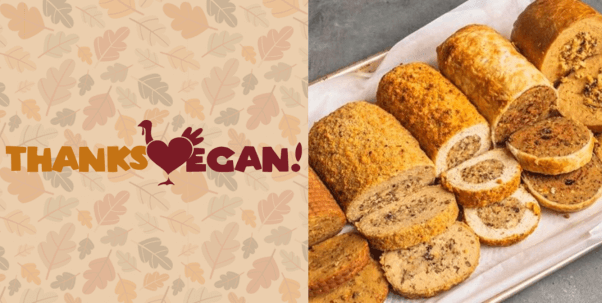Food, Marvellous Food
Q. How do I make turkey, stuffing, pumpkin pie, mashed potatoes, and other holiday foods vegan?
A. The internet is our friend! Every holiday dish can be made vegan, including with meatless roasts, dairy-free mashed potatoes, and no-egg desserts. PETA has you covered with delicious holiday recipes to please every palate this ThanksVegan. You can also search online for any Thanksgiving food and add the phrase “vegan recipe” to find a delicious dish.
Good Guests Bring a Plate … or Three
Q. How can I be helpful to the host? I’m not hosting this year, but I still want to eat with my loved ones.
A. Bring a vegan main dish, a few sides, or a dessert (which always wins people over!). Don’t be shy about showing off your cooking skills—the more vegan food you can bring, the better. If cooking isn’t your calling, it’s super-easy to pick up a premade dish from your local grocery store—a vegan pumpkin pie from Whole Foods or a bottle of vegan wine from Trader Joe’s would surely go over well. Meal delivery services like Veestro, Boycemode, and MamaSezz are all participating in ThanksVegan, offering tasty Thanksgiving-themed options this year. A scrumptious veganized dish helps people realize that animal-free food doesn’t require any compromises when it comes to flavor.
Share some fabulous vegan recipes with your host ahead of time and see if they’re willing to make some dishes vegan.
If your host is receptive to your ideas so far, why not suggest a totally vegan Thanksgiving? Offer to help them cook a spread of vegan eats. If they had already planned a menu, share this list of easy vegan substitutions for a delicious ThanksVegan meal.
 © instagram.com/purplecarrotxo
© instagram.com/purplecarrotxo
Host With the Animal-Free Roast
Q. How can I have a vegan Thanksgiving?
A. You can host the meal! Not sure where to start? PETA has tons of free menu ideas and recipes.
Short on money and time? This budget-friendly Thanksgiving meal is a great option. Both you and your wallet will love the $40 dinner, complete with vegan gravy and a pie and ready in under an hour.
Love to cook? This full Christmas dinner makes for an excellent ThanksVegan spread.
There are also many other free resources online to help you host an awesome Thanksgiving.
Q. I want to find a vegan Thanksgiving celebration in my area. Where do I start?
A. Depending on what’s available in your area—and whether social distancing restrictions are in place for public events—you may be able to attend a community vegan potluck. Vegan potlucks are typically on Thanksgiving or on a day after the holiday. Facebook or Meetup.com can help you find events in your area.
Talking the Talk While Holding the Fork
Q. What if nonvegan friends or family ask me questions about being vegan?
A. Come prepared with a few talking points. Having some answers ready makes conversations productive. People might ask you questions like these:
“Why are you vegan? What about protein? Do you miss eating animals?”
Remember that you can’t prepare for everything, and that’s OK! You don’t need to be an expert on every issue to have a conversation with someone about animal rights and vegan living. Check out PETA’s tips on effective advocacy techniques before your meal.
Let others know that humans can live longer, healthier lives by not eating animals. Vegan protein is not only better for your body but also cheaper! Beans, quinoa, and veggie burgers are some of PETA’s favourite staples that save money and spare animals’ lives.
“What if you were stranded on a desert island with only meat to eat?”
Being vegan is not about being perfect—it’s about doing the best we can. Choosing not to eat animals is one of the best things we can do for them, the environment, and our own health. We can’t fix the entire world, but we can have a positive impact by going vegan.
“Don’t you care about [insert other issue]?”
Vegans care about many issues! Noticing one form of injustice helps us notice other types of discrimination in society. Going vegan doesn’t take time or attention away from other issues. In fact, being vegan is part of the solution—it helps the environment, boosts community health, and offers an answer to world hunger.
“But you used to love eating cheeseburgers [or another animal-derived food]!”
Cows are gentle individuals who care for their young and get excited when they solve problems. In the beef industry, these sensitive beings are forced to live amid their own faeces. The dairy industry forcibly impregnates mother cows and steals their day-old calves. Learning about animal agriculture leads many kind people to eliminate foods that others had to suffer for, in order to be true to their values.
There are now fabulous vegan options that not only taste a lot like animal-derived foods but also have similar textures. If your friends and family are curious about what vegans eat on a daily basis, PETA’s guides to meat replacements and vegan cheese may help.
Cat Got Your Tongue?
Q. What do I say when I don’t know what to say?
A. You don’t have to be an expert on every issue under the sun. If someone asks you a question that you can’t answer, don’t sweat it! It’s fine to say, “I don’t know.” You could hop onto a cellphone together and search for the answer on PETA’s website. Below are some approaches for answering tough questions.
“What about [insert issue you don’t know much about]?”
“I want to make sure I get you the best information I can. I’ll look into that and send you some resources later. What’s your e-mail address?”
“What about [insert activism tactic or group that you aren’t part of]?”
“I can’t speak on that, but I’m sure there’s information about that online. I hope you’ll let me know what you find out if you look into it.”
Meet Challenges With Kindness
Q. How should I handle people who are rude to me or act offended that I don’t eat animals?
A. Assume the best. The person asking you a seemingly rude question may be asking it sincerely. Don’t roll your eyes or storm off. Try to answer their question directly. Some people actually do wonder if cows will explode if they aren’t milked by humans. (The answer is no, and cows only need to be milked because humans steal their calves.)
If someone does try to provoke or tease you, remember that your conversation draws other people’s attention. When we answer questions directly, others at the table can benefit from the information we give. Staying calm means that other guests will feel comfortable asking you questions about going vegan or animal rights—which ultimately helps even more animals.
Face Challenges With a Smile
Q. What if someone pressures me to eat meat or other animal-derived foods?
A. We can be polite while declining cruelly derived ingredients. We can smile at our host and say, “Thank you for offering! But I’ll stick with what I have.” Reassure others that their company makes the holiday special for you, and tell them that you’re having a wonderful time without eating turkey, dairy, or eggs.
Sometimes, our family members can be insistent. Give them time to realize that being vegan is not a “phase.” Be consistent and patient and you’ll likely find that people in your circle adapt to your compassionate choices.
Kindness to Animals Extends to You, Too
Q. How do I handle watching people eat animals?
A. Relate to where others are at. Attending a Thanksgiving celebration where people are eating animals can be hard. We know that our loved ones are good people, so it can be uncomfortable to see them eating dishes that animals were abused for. Remember, most of us weren’t born and raised vegan. Before you went vegan, you ate animals at Thanksgiving, too, right? Were you heartless? No. It was listening to your heart that caused you to go vegan.
The other people at the table also have big hearts. You can expose these kind folks to compassionate thinking by remaining in their lives and attending holiday events. One day, through knowing you—and seeing how important kindness is to you—they may find that eating animal-free better aligns with their values, too. Your non-judgmental presence and your vegan food say more than you may think.
Don’t Come Empty-Handed
Q. What if people at my Thanksgiving event want more information on vegan foods or animal rights?
A. Bring literature with you. E-mail us at ActionTeam@peta.org and ask for some vegan literature (or order materials online), and come prepared with some in your bag. If someone is clearly open to learning more, you can respond with, “I have some information here you might be interested in!” You could also direct them to PETA’s social media pages, help them download a vegan starter kit from our website, and even encourage them to sign up for our Vegan Mentor Program.
Community Is Key
Q. How can I feel better after a challenging Thanksgiving experience?
A. Spend time with other vegans. It can be emotionally draining to feel like the lone defender of animals at an event, so counteract those feelings by spending quality time with like-minded friends. Don’t have friends interested in animal rights? Join PETA’s Action Team to connect with compassionate people in your area and across the country. You could also search online for vegan or animal rights social groups.
Keep the Holiday Spirit Going
Q. I want to do something helpful after seeing animals abused for the Thanksgiving table. What can I do?
A. Volunteer your time or money, if you can. Giving to those in need can help us decompress from a difficult experience. Order PETA’s free Activist Starter Pack, which is full of easy and effective ways to help animals. You can advocate for animals exploited for food with our action alerts and by supporting our campaigns.

No comments:
Post a Comment